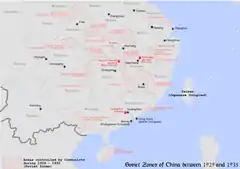Autumn Harvest Uprising
The Autumn Harvest Uprising was an insurrection that took place in Hunan and Jiangxi provinces of China, on September 7, 1927, led by Mao Zedong, who established a short-lived Hunan Soviet.
| Autumn Harvest Uprising | |||||||
|---|---|---|---|---|---|---|---|
| Part of Chinese Civil War | |||||||
 The location of Autumn Harvest Uprising. | |||||||
| |||||||
| Belligerents | |||||||
| Commanders and leaders | |||||||
|
| |||||||
| Casualties and losses | |||||||
| about 390,000 Hunanese civilians were killed[1] | |||||||
| Autumn Harvest Uprising | |||||||||
|---|---|---|---|---|---|---|---|---|---|
| Simplified Chinese | 秋收起义 | ||||||||
| Traditional Chinese | 秋收起義 | ||||||||
| |||||||||
After initial success, the uprising was brutally put down by Kuomintang forces. Mao continued to believe in the rural strategy but concluded that it would be necessary to form a party army.[2]
Background
In support of the Northern Expedition, Mao was sent to survey peasant conditions in his home province of Hunan. His Report on an Investigation of the Peasant Movement in Hunan urged support for rural revolution.[3]
The uprising
Initially, Mao struggled to garner forces for an uprising, but Li Zhen rallied the peasantry and members of her local communist troop to join.[4] Mao then led a small peasant army against the Kuomintang and the landlords of Hunan, successfully establishing a Soviet government. The uprising was eventually defeated by Kuomintang forces within two months after the Soviet was established. Mao and the others were forced to retreat to the Jinggang Mountains on the border between Hunan and Jiangxi provinces, where he encountered an army of miners which would help him in later battles. This was one of the early armed uprisings by the Communists, and it marked a significant change in their strategy. Mao and Red Army founder Zhu De went on to develop a rural-based strategy that centered on guerrilla tactics. This paved the way for the Long March of 1934.
Mass killings against Hunanese civilians
Nationalist anti-communist mass killings were directed against all Hunanese civilians. About 80,000 Hunanese were killed in Hunan's Liling and about 300,000 Hunanese were killed in Hunan's Chaling County, Leiyang, Liuyang and Pingjiang.[5]
Notes
- Short, Philip (18 December 2016). Mao: The Man Who Made China. ISBN 9781786730152.
- Li, Xiaobing. China at War: An Encyclopedia (ABC-CLIO, 2012) pp 5–8.
- Hofheinz, Jr. (1977).
- Wu 吴, Zhife 志菲 (2003). "Li Zhen: cong tongyangxi dao kaiguo jiangjun 李贞:从童养媳到开国将军". Renmin Wang. Archived from the original on 8 July 2015. Retrieved 27 November 2011.
- Short, Philip (18 December 2016). Mao: The Man Who Made China. ISBN 9781786730152.
References and further reading
- Hofheinz, Jr., Roy (1977). The Broken Wave: The Chinese Communist Peasant Movement, 1922-1928. Cambridge, Mass.: Harvard University Press. ISBN 9780674083912. Reprinted: De Gruyter, 2014 eBook Archived 2018-06-09 at the Wayback Machine
- Li, Xiaobing. China at War: An Encyclopedia (ABC-CLIO, 2012) pp 15–16.